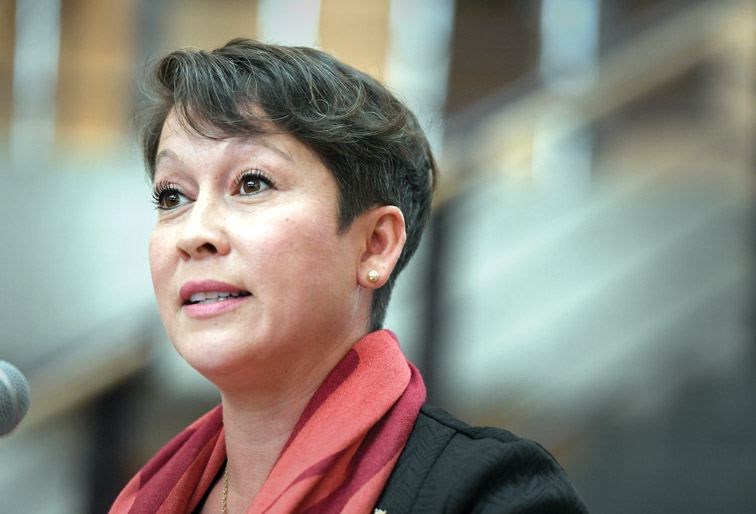Education played a key role in Melanie Mark’s journey from an impoverished childhood in east Vancouver to becoming the first First Nations woman to serve in the B.C. Legislature.
As the province’s new minister of advanced education, skills and training, Mark said she is already working to reduce barriers to post-secondary education and adult continuing education – efforts which she hopes will help others break the cycle of poverty.
“Poverty sucks. We know how poverty hurts society,” Mark said. “I think (education is) your opportunity to prosperity.
“We’re trying to do everything we can with our government to make sure people can get that education.”
Mark was the first keynote speaker at the 2017 Inspiring Women Among Us event at UNBC on Thursday. The annual celebration runs until Nov. 29, with daily events around Prince George.
Mark told the crowd her education journey had a rocky start.
“I grew up in poverty in east Vancouver with a single mom. I went to six elementary schools and seven high schools,” she said. “I was a kid in foster care. I was the kid living with family members, that’s why I went to so many schools.”
Mark said she was a poor student “who spent more time in the hall than in class,” until a rugby coach inspired her. She decided to become a P.E. teacher and pursued that dream to college.
“When I went to Malaspina College I didn’t have the study skills, I didn’t have the discipline – so I failed,” Mark said.
After working as an advocate for aboriginal youth and volunteering with programs like Big Brothers, Big Sisters, she decided to pursue a career in law enforcement.
“I went to Native Education College to be a police officer. I thought if I could be a police officer, I could be a change agent,” she said.
But she became impatient for change and switched to study political science at Simon Fraser University.
“I thought if I could understand the system, I could fight the system,” she said.
As many as 80 per cent of future jobs will require some form of post-secondary education, Mark said. So it’s important to break down barriers of race, gender, wealth and class when it comes to accessing education.
“If you create an equal playing field, more people can play ball,” she said.
The NDP government has already cut the interest on student loans by 2.5 percentage points, expanded the tuition waiver program for children in care and restored funding to eliminate tuition fees for English as a Second Language and Adult Basic Education programs, Mark said.
She said the ministry is looking at other ways to make post-secondary education more affordable, which includes examining tuition rate, but also other areas like access to affordable student housing and grants.
In particular, she said, her ministry is examining the creation of completion grants to offer financial relief for students who complete a degree or program, and scholarships for graduate students.
Equally important is making sure education institutions are welcoming to all people. There is still work to do to eliminate barriers of race and gender, she said.
“I was the lone Indian when I went to school,” Mark said. “I had a chance to visit all 25 post-secondary institutions (in B.C.) after being elected. Some are doing a good job of supporting indigenous students, some less so.”
For more information about the Inspiring Women Among Us event, including a schedule of events, go online to www.unbc.ca/inspiring-women/events.



